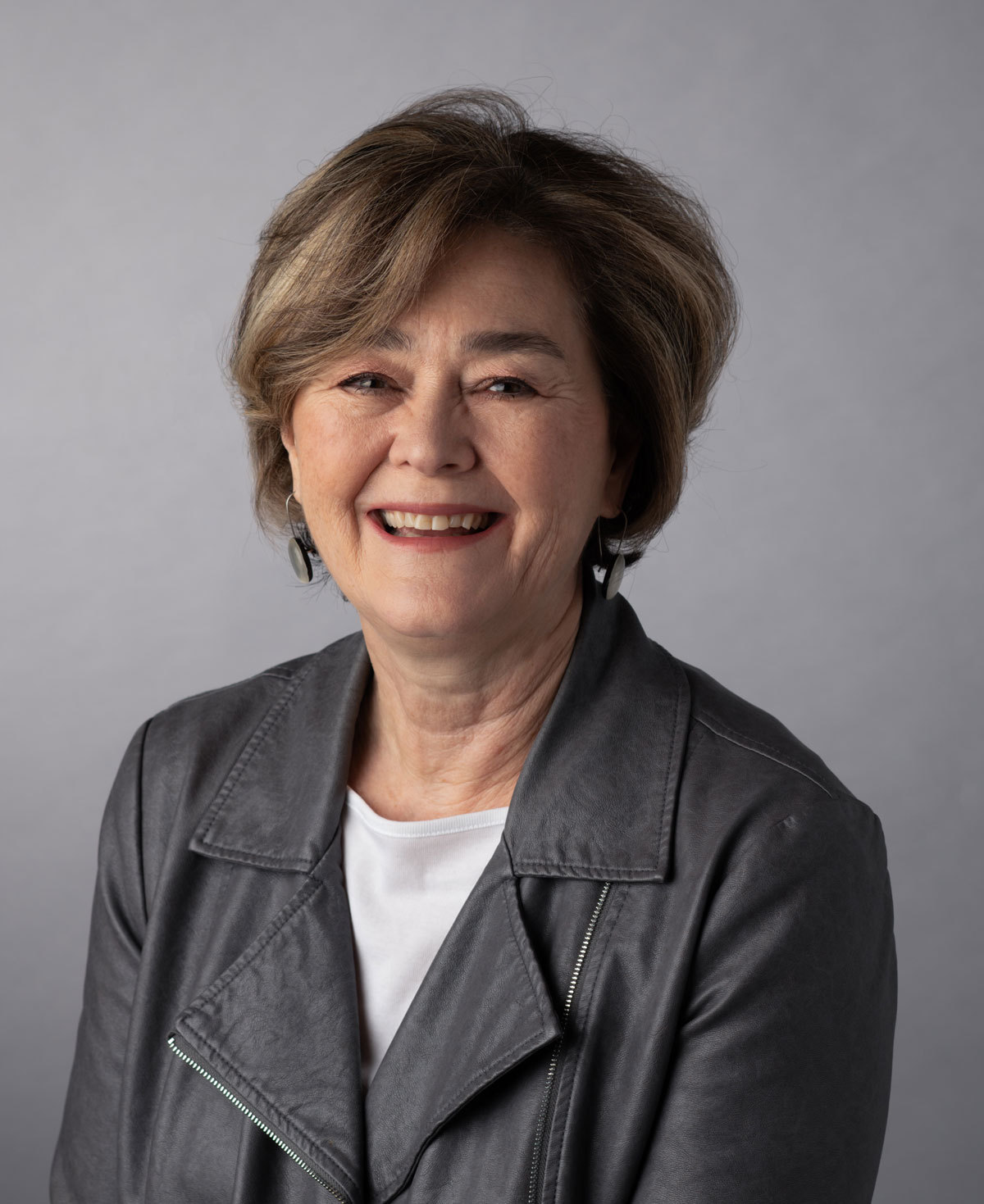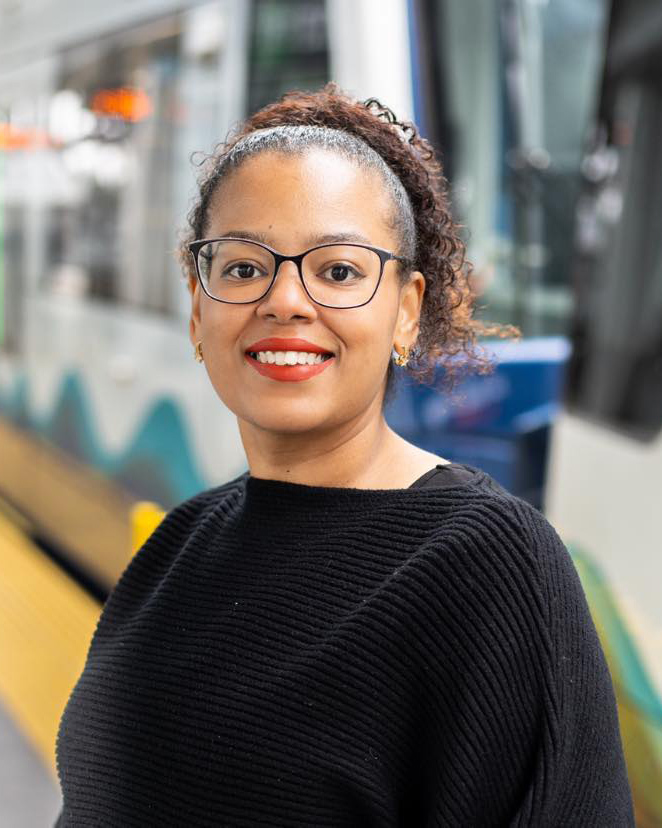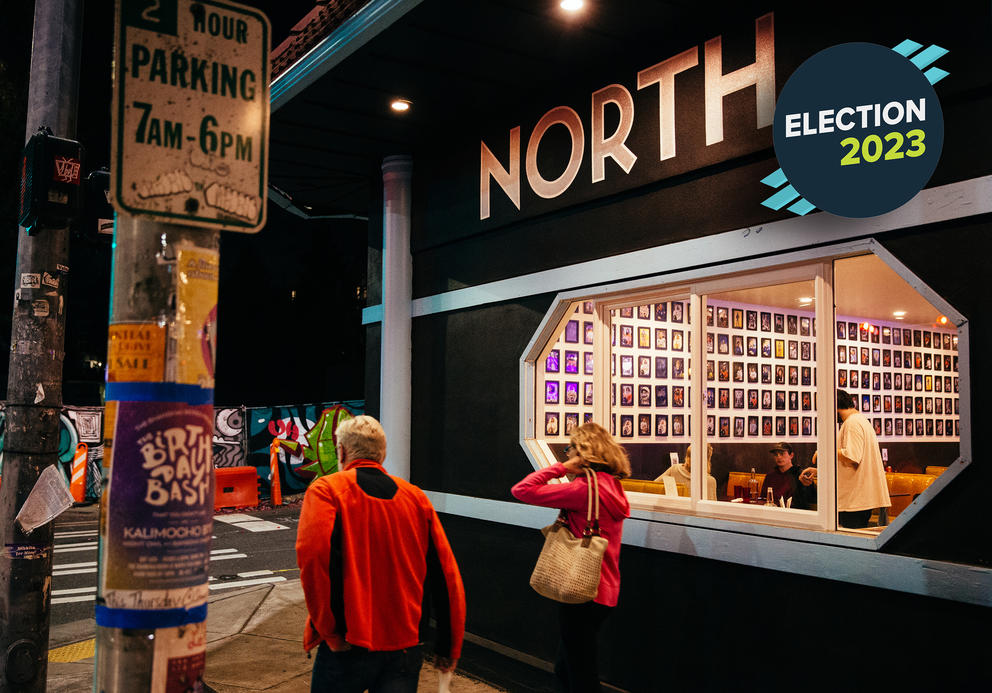Cathy Moore is a retired King County Superior Court Judge. She began her legal career as a public defender; was the interim Seattle city clerk managing records and administration for the City Council; was an interim legislative aide for former City Councilmember Richard Conlin and served as an administrative law judge. She also chaired the Seattle Human Rights Commission.
Moore said she was motivated to run for office by a concern over issues such as public safety and Seattle’s decreasing affordability as well as a desire to use the final chapter of her career to make a positive impact.
“I want to be an advocate, and, as trite as it sounds, I want to be working more proactively and upstream,” said Moore. “I feel like the city has kind of lost its way. I mean, we’ve done some really good things, but we’ve also kind of lost our way since COVID.”
ChrisTiana ObeySumner is the CEO of Epiphanies of Equity, a social equity consultancy. Prior to the pivot to equity consulting, they worked as a housing navigator at Harborview Medical Center and as a counselor and case manager for nonprofit housing and shelter providers Downtown Emergency Services Center and Compass Housing Alliance. ObeySumner also co-chaired the Seattle Disability Rights Commission and the Seattle Renters Commission.
ObeySumner wants to bring their career experience in policy and affordable housing, as well as their lived experience as a Black person who has physical disabilities and autism and grew up poor, to tackle the city’s big problems at their roots.
“I feel like [city office] is the next natural step of the work that I’ve been doing throughout my life,” said ObeySumner. “I’ve worked with so many of the folks not just on the dais, and not just at City Hall, but at the county, at the state, in the network of intergovernmental relationships. I feel that being able to bring all of the nerdy wonky knowledge as well as the wisdom of the lived experience … makes me a great person to be able to represent this district and hopefully beyond in the future.”
Crosscut sat down with both candidates to talk about their priorities for Seattle, compare and contrast their ideas for making progress, how to pay for programs and much more.
The Issues
Public safety
For Moore, public safety is the No. 1 campaign issue, and one of the key areas where she thinks the City Council has lost its way. She said she wants to see the city rebuild a fully staffed police department, but also bolster accountability measures and expand alternative response systems.
Moore said she supports Harrell’s goal of hiring 1,400-1,450 deployable officers, up from the current 950 or so. Although there are hiring bonuses and marketing campaigns, hiring has remained slow, with the Seattle Police Department still losing officers about as fast as it can recruit new ones.

Moore said a new union contract between the city and the Seattle Police Officers Guild will be crucial for hiring. “If we had a contract in place, that would send a signal to the rank and file that the city values them as employees,” she explained. Negotiations have been underway since SPOG’s previous contract expired in 2020.
A new contract will also be a critical factor in creating the robust police accountability system Moore envisions. In 2017, the Seattle City Council passed a suite of police accountability measures that made it easier to discipline and fire officers for misconduct. The previous SPOG contract weakened those accountability measures, but the Council voted to adopt it in 2018 despite protests by accountability advocates. Moore wants to reinstate such measures.
Along with sworn officers, Moore is excited about the new CARES Department dual-dispatch pilot that sends mental health professionals out with officers to respond to some emergencies where someone is in crisis. She also wants to expand the scope of non-police response to include “community service officers” for situations such as responding to property crime that might not require a sworn officer or a social worker.
Moore also supports expanding nonprofit-led community violence interruption programs like Rainier Beach Action Coalition and the SE Network, and would like to see such programs launched in District 5.
In general, Moore said she thinks there would be less crime if Seattle had more of a social safety net in the first place. As a judge she found that in the case of many of the defendants before her, “if we had done a better job earlier on they probably would not have wound up there.”

When it comes to policing, ObeySumner wants to see 911 call response times reduced, something they said could be accomplished by investing in more police alternatives that help give existing officers more capacity to respond to high-priority issues. They also want SPD to focus more on community policing to rebuild trust between the department and residents.
In addition, ObeySumner wants to expand community involvement in crafting public safety strategies and increase the city’s support for survivors of crime with counseling, financial assistance and other services.
But as with all of Seattle’s biggest problems, they want to focus on root causes in order to really address crime and other public safety issues.
“We have a tendency to see these social ills come up and we say, OK, we need to address this outcome right now,’” ObeySumner explained. “We try to take an effect and make it the cause. But what’s really important to me is how do we put upstream solutions in place so that we have effective and collective and sustainable downstream results?”
Their upstream solutions for crime and safety include more housing, addiction treatment, mental health services and job training programs.
In that vein, ObeySumner does not support arresting people for public drug use, calling it a rehashing of the failed War on Drugs. Instead, they want the city to expand the availability of treatment and to experiment with things like Europe’s overdose prevention centers, which allow people to consume drugs with less risk of preventable overdose and have case workers onsite to connect people to services when they’re ready.
Moore also wants to expand the availability of on-demand drug treatment. But she isn’t opposed to using the criminal-legal system as a path to get people to treatment. As a judge, she said she would try to use drug-offender sentencing alternatives whenever possible. “I think [a carceral approach] should be the last resort. But I also think it ought to be a tool available to us.”
Homelessness and housing
ObeySumner believes in a Housing First approach to homelessness, which prioritizes getting people into stable housing as quickly as possible.
Given that Seattle doesn’t have anywhere near enough units of affordable housing for everyone experiencing homelessness, ObeySumner wants to focus efforts on constructing more. Drawing on her experience working for an affordable-housing provider, they said the city should also be building a wider variety of affordable housing and permanent supportive housing to meet people’s needs. For example, affordable-housing developers mostly build studios and one-bedroom apartments to maximize the number of people they can serve. But ObeySumner said that can lead to couples and families getting split up or left without suitable housing.
They also said that without addressing the homelessness and affordable-housing sector’s workforce crisis, Seattle will be unable to make progress on the issue. Low pay and challenging work have led to significant turnover and vacancies. “You can’t increase access to services if you don’t have anyone to staff them,” said ObeySumner.
ObeySumner does not support sweeping homeless encampments, calling those efforts not just harmful, but unhelpful to anyone. Instead, they think it makes more sense to invest in hygiene facilities and mental health services at encampments to improve people’s health while helping transition them to housing.
Moore also said the city needs to build significantly more permanent supportive housing. She’s happy that Mayor Bruce Harrell tripled the size of the Seattle Housing Levy for its renewal this fall, and hopes voters pass it. She also thinks there’s promise in using federal Medicaid dollars to help fund affordable housing.
Because housing is slow to finance and build, Moore wants to see the city open more tiny home villages to give people a place to go instead of living in street encampments. She also wants to expand rental subsidy programs to help keep people from falling into homelessness in the first place. “I think the one thing you can say the Regional Homelessness Authority was very successful at was using COVID dollars to keep people housed.”
To address housing affordability on the open market, Moore said she supports increasing density and ending exclusionary zoning. “If we have diversity of housing including duplexes, triplexes, quadplexes and apartments in all neighborhoods, I think ultimately that makes us healthier,” she said.
Still, Moore said, “I think we do have to be concerned with questions of scale and height.” She would prefer that taller apartments be built on corner lots to preserve the sense of scale in the rest of the neighborhood.
ObeySumner is a staunch supporter of missing-middle housing such as duplexes, triplexes and small apartment buildings. But they want Seattle to be mindful of Americans with Disabilities Act compliance as it moves toward implementation of the state’s missing-middle density law. “My disability would make it so that if my bedroom was upstairs, I would be sleeping on the couch every night. And that is not OK.”
ObeySumner also wants to ensure that Seattle’s zoning rules allow denser housing and especially affordable housing in all parts of neighborhoods, not just along busy arterials where there are higher levels of pollution and noise from vehicles.
Climate
Moore envisions creating a Department of Climate Resiliency, which would bring all the city’s climate-related work under one department. She also wants to expand the number of climate-resilience hubs by improving air filtration, air conditioning and heating at libraries, community centers and schools. Moore also wants to do more to protect existing trees and open spaces.
Both candidates said they want to help subsidize heat pump purchases for low-income residents to provide more climate-friendly heating and cooling as weather gets more extreme.
ObeySumner wants to protect Seattle’s tree canopy. And while they don’t think trees and density are incompatible, they do think there should be a moratorium on the city’s new tree ordinance until local tribes get a chance to weigh in. The issue recently came to the fore during a fight to save a mature tree in Wedgwood from development. The Snoqualmie Tribe declared it a “culturally modified tree” that should be saved.
Paying for campaign promises
Driven in part by the slowing real estate market, layoffs in the tech sector and inflation, Seattle is projected to face a $251 million general-fund deficit in 2025 that will grow to nearly $500 million in 2026. The incoming City Council will have to navigate that shortfall as they seek to fulfill their campaign promises.
Progressives want the city to levy new taxes to tap into Seattle residents’ vast wealth. Business leaders and the Seattle Metropolitan Chamber of Commerce want city officials to tighten the belt and take a close look at existing spending to find savings.
ObeySumner said it’s a “both, and” situation. But they don’t expect to find too many savings from a budget audit, so it’s likely Seattle would need new sources of revenue. They support most of the ideas suggested by the Revenue Stabilization Workgroup, including the city-level capital gains tax and expanding the Jumpstart Payroll Tax on large employers. ObeySumner also wants the city to lobby the state legislature to finally allow a statewide income tax.
Moore comes down on the issue in a similar place as her opponent. She thinks it’s a responsible starting place to audit the budget and make sure city programs are working efficiently, but doesn’t expect that will be enough, especially if trying to avoid layoffs. She also supports the idea of a city-level capital gains tax, and said she would consider expanding JumpStart. She also likes the idea of a statewide income tax. “I’m not sure it would be the magic wand and then suddenly all our problems would be gone. But it certainly would help things.”
Fundraising and endorsements
As of this writing, ObeySumner has raised over $100,000 in donations. Moore has received over $84,000 in donations, though $22,000 of it came from Moore herself, according to campaign finance records.
Moore also has an independent expenditure committee, the Greenwood Neighbors Committee, raising money on her behalf. The group has raised $69,000 so far from many of the same conservative business people funding independent expenditure committees backing Rob Saka in District 1 and Maritza Rivera in District 4.
Greenwood Neighbors Committee’s donors include the Master Builders Association’s Affordable Housing Council, developer John Goodman and his business partner George Petrie. Petrie has given tens of thousands of dollars to GOP candidates in recent years and started making monthly donations to Donald Trump after the Jan. 6 insurrection. As of the committee’s most recent disclosure filing, it had not yet spent any money in support of Moore.
ObeySumner has been endorsed by Sens. Rebecca Saldaña and Noel Frame, Reps. Chipalo Street and Darya Farivar and King County Councilmember Girmay Zahilay among others. They have also received endorsements from a number of organizations and unions including the King County Democrats, 36th and 46th Legislative District Democrats, Sage Leaders, Working Washington, Amalgamated Transit Union, United Auto Workers 4121, Moms Demand Action and Planned Parenthood Votes WA.
Moore has been endorsed by Mayor Harrell, current D5 Councilmember Debora Juarez, King County Executive Dow Constantine and state Reps. Cindy Ryu, Gerry Pollet and Chris Stearns, among others. She also has the support of the MLK Labor Council, Seattle Building Trades Union, Seattle Firefighters Union, Alliance for Gun Responsibility, 32nd District Dems, Seattle Hospitality for Progress and more.
Correction: A previous version of this story referenced a fight to save a tree in Wallingford. The tree is in Wedgwood.



